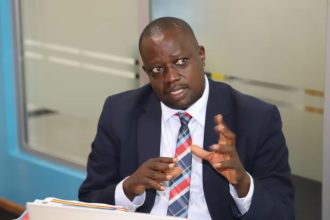There are several reasons why some Bamasaba people are apprehensive about a strong cultural institution.
In Rwanda, when journalists asked President General Habyarimana why some Batutsi (the Tutsi) were fleeing the country, he responded that he thought they might be afraid of the prevailing peace. It is indeed paradoxical to say someone would flee from peace. Similarly, why would someone fight the cultural institution that essentially gave them their identity, unless they are not of that tribe or lineage?
A few self-proclaimed “state mercenaries” lurk on every Whatsapp forum with the false intention of undermining the leadership of the Bukuka. This is a futile exercise, and their negativity will achieve nothing. Let me share another example from a book I read titled “The Making of a Modern Mercenary,” which I read about ten years ago. In the book, a passerby greets a mercenary and wishes him peace. The mercenary becomes infuriated by the greeting, claiming that he thrives on war and peace would bring him hunger. Indeed, there are those who might struggle if the funding to fight the Bukuka disappears.
Those who are paid to undermine the leadership will not succeed. According to recent research, a vast majority, approximately 90% of the Bamasaba, fully support the cultural institution.
A few disgruntled individuals, likely motivated by a desire to maintain their fame or political influence, want to continue with old conflicts. These groups have used various methods to fight the Bukuka leadership, but with little success.
The Ugandan constitution and the Cultural Leaders Act of 2011 discourage the cultural institution or its leaders from compelling anyone to swear allegiance. The institution has never deviated from this and will not force anyone to finance it. We stand with the 90% according to the recent research.
A credible online cultural website recently revealed research suggesting that 90% of the Bamasaba believe a central, neutral voice in the community is valuable, and Umukuka serves as that voice.
A few disgruntled individuals on someone’s payroll know that a strong cultural institution could diminish their influence.
The cultural institution embodies the people’s culture and customs. It unifies all groups in the community, regardless of political affiliation, religion, education level, socioeconomic status, age, gender, or physical ability.
Many cultural experts believe it’s wrong for anyone to fight the cultural institution. The best approach is to support it. Those who undermine the cultural leadership could face difficulties as the 2026 general elections approach, as citizens are watching them, warns an expert on cultural matters who preferred anonymity due to the sensitivity of his statement.
Elsewhere, politicians have been seen seeking close ties with their cultural institutions, understanding the consequences of maintaining a defiant distance.
The Bamasaba cultural institution is both a statutory and cultural organization, established in line with state policy objectives, constitutional provisions (Article 246), the Cultural Leaders Act of 2011, the Local Government Act, and the National Cultural Policy of 2019.
Without the Ugandan constitution and Cultural Leaders Act, cultural institutions in the country would be on shaky ground. Many groups with similar aspirations for unity have previously had to operate under the Companies Act or the NGOs Act.
The cultural institution serves as a custodian of the people’s culture and norms. The cultural leader is expected to be accorded the utmost respect and is expected to mobilize and guide the community towards a serious development agenda. The cultural leader is a symbol of unity and should be seen as an embodiment of unity in the community.
The cultural leader should avoid getting bogged down by minor issues. The Latin phrase “non parva attendunt,” which translates to “don’t pay attention to petty things,” is relevant here.
Among the Bamasaba, there is a small insect called the Khawutsasi. This small insect is intimidated and disturbed by anything bigger than itself. We don’t want our people to behave that way. The Khawutsasi will bolt first from anything bigger than itself. As we approach 2025, let us promote genuine unity and work together as a community to solve the problems that plague our people’s lives.
Let us come out in force to support the cultural institution. As His Highness Jude Mike Mudoma, the Umukuka III, recently stated, he is here for unity and will always be a unifier. Retribution has no place in his agenda.




















